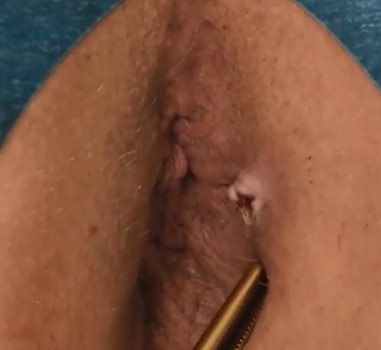Proctology
Fistula in Ano

What is Anal Fistula?
A fistula is a tract or a connection between an opening on the skin and another inside the anal canal.
How will I know that I have fistula in ano/Anal fistula?
The most common symptom fistula has is that you feel a small pimple or a swelling near the anal opening which has something leaking from it which can be pus, blood or watery.
Sometimes before leaking the swelling becomes painful and once it bursts the pain stops an it may heal for a few days to come back again after some time.
If you have any of these symptoms you should consult a doctor who would do a local examination and will suggest an MRI of the local area to diagnose.
What are the treatment options for fistula in ano?
Conventional treatment options were fistulotomy or fistulectomy. In fistulotomy the fistulous fact was laid open and given time to heal. In fistulectomy the entire tract is excised which leaves behind a wound that heals with regular dressings. This process takes a long time extending fro weeks to months.
Advancements in treatment have led to minimally invasive methods for treatment.
One is LIFT which is Ligation of Intersphincteric Fistulous Tract, which is done via a very small cut and does not require dressings.
Other treatment option is DIODE LASER where again the treatment does not lead to any wound, there are no stitches and no dressings needed.
I had pain/bleeding which was diagnosed as fistula but it resolved with medications. Now I don’t have any pain/bleeding. What should I do?
It is true that many times bleeding and pain of fistula resolves with medications. One must seek medical examination by a surgeon to assess the extent of fistula. Fistula does not heal with medications it is only the infection which gets healed and you get relief from symptoms but the fistulous tract stays there and keeps growing with time. The cycle of pain and swelling which bursts with relief keeps repeating again and again. If you leave the problem unattended gradually you might end up with complications.
What are the possible complications of fistula in ano?
If untreated fistula can keep growing and extending to multiple branches and it might develop into a high fistula which is very difficult to treat.
If I have the fistula surgery will it affect my digestion and do I need to be on lifelong dietary restrictions, will there be narrowing of anal canal, will I loose my ability to hold motions?
There are no specific dietary restriction but yes you would be advised to take healthy diet and avoid constipation. Though after surgery for initial couple of days you will be kept on a liquid diet. With advancements in fistula surgery there is no risk of narrowing of anal canal and there is no
change in ability to hold motions.
What are the preparations required before surgery and what should I expect during hospital stay and after discharge?
The preparation for surgery will be started from the outpatient department (OPD). You will be advised to undergo a few tests to assess your body functions and a pre-anaesthetic check-up (PAC) will be done by an anaesthesiologist (a specialist doctor) who will assess your fitness for anaesthesia.
Most likely you will be admitted on the day of surgery unless you have some specific concerns which warrant some extra stay before the surgery.
You will be advised not to eat or drink anything from midnight of the day prior to surgery and not to eat or drink anything on the morning of admission as well. If you take some medications regularly in the morning than please do not forget to discuss regarding them with your doctor so that he advices you on which medicine to take and which not to take.
Upon admission some paper work will be done and you will be asked to sign consent forms for anaesthesia and surgery.
You will be asked to change in to hospital clothing, shaving of the area will be done and you will be given some intravenous medications and an enema.
Once the preparations are done you will be wheeled into the preoperative area where nursing staff and doctors will confirm your identity and then you will be shifted to the operating room.
Your anaesthetist will put you under spinal or general anaesthesia and then surgery will start. Usually it takes about one hour for the surgery to be over and then you will be shifted to post-operative recovery area in conscious state. You will be kept there for couple of hours and then you will be shifted to your designated room.
A catheter (pipe) might be put to drain out urine for maximum 24 hours and will be removed before you are Sent home.
You will be discharged to home the day after the surgery. You will be advised some medications on your discharge. You will be advised to take liquid diet at home for five days and then gradually you can start having normal diet.
Usually if all goes well you will be called for a visit to OPD five days after discharge.
How soon can I resume work after surgery? How much bed rest is advised? Is there any specific season of year when I should opt for surgery?
No bed rest is advised. You will be encouraged to walk about on your own from the next day of surgery. You can resume normal household work two days after surgery. Climbing stairs will not be a problem.
Considering that almost all hospitals and households have air conditioning the season has become irrelevant so you can plan surgery as per the need and convenience anytime round the year.
